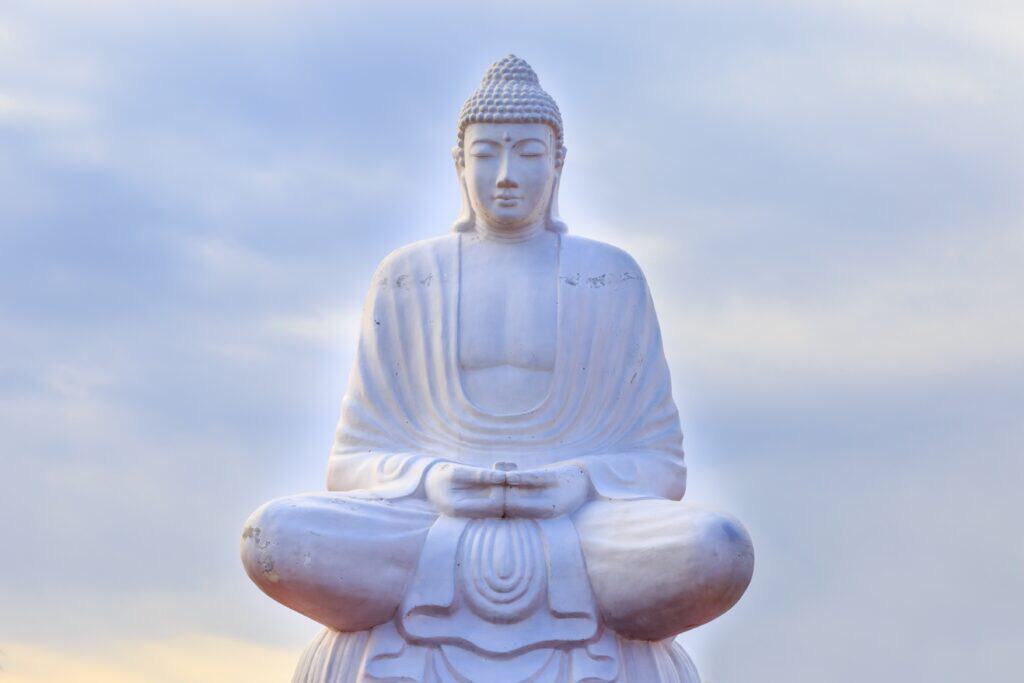Buddhism is a religion that is based on the teachings of Siddhartha Gautama, also known as the Buddha. One of the core principles of Buddhism is the adherence to ethical guidelines and moral conduct. These guidelines are known as the Five Precepts and are an essential part of Buddhist doctrine, both for laypeople and monastics.
The Five Precepts are a set of moral and ethical guidelines that Buddhists follow to lead a life of compassion, mindfulness, and wisdom. The precepts are not commandments or rules, but rather voluntary guidelines that one undertakes to facilitate practice. The Five Precepts are: to refrain from taking life, to refrain from taking what is not given, to refrain from sensuous misconduct, to refrain from false speech, and to refrain from intoxicants as tending to cloud the mind.
The Five Precepts are an essential part of Buddhist practice, and they help Buddhists to cultivate mindfulness, compassion, and wisdom. They provide a framework for ethical behavior and moral conduct that is in line with the teachings of the Buddha. By following these precepts, Buddhists strive to live a life that is free from harm, both to themselves and to others, and to cultivate a mind that is clear, compassionate, and wise.
The Five Precepts
Buddhism is a religion that emphasizes the importance of moral conduct and ethical guidelines. The Five Precepts are a set of commandments or rules that lay Buddhists undertake voluntarily to facilitate practice. These precepts are a commitment to moral conduct and non-harming, and they help practitioners to avoid negative karma.
First Precept
The first precept is to refrain from taking the life of a living being. This precept is often interpreted as a commitment to non-violence and compassion for all living beings. It is not limited to humans but applies to all sentient beings. This precept also includes the understanding that all life is interconnected and that harming one being can have a negative impact on the entire ecosystem.
Second Precept
The second precept is to refrain from taking what is not given. This precept is about respecting the property of others and not taking what does not belong to us. It also includes not deceiving others or engaging in fraudulent activities. This precept helps to cultivate a sense of honesty and integrity.
Third Precept
The third precept is to refrain from sensuous misconduct. This precept is about avoiding sexual misconduct or engaging in sexual activities that harm others. It also includes avoiding sexual activities that are exploitative or abusive. This precept helps to cultivate a sense of respect for oneself and others.
Fourth Precept
The fourth precept is to refrain from false speech. This precept is about being truthful and honest in our speech. It includes not lying, not gossiping, and not engaging in idle chatter. This precept helps to cultivate a sense of mindfulness and awareness of our speech.
Fifth Precept
The fifth precept is to refrain from intoxicants as tending to cloud the mind. This precept is about avoiding the use of drugs or alcohol that can impair our judgment and lead to harmful behavior. It also includes avoiding activities that can lead to addiction or dependence. This precept helps to cultivate a sense of clarity and awareness of our actions.
In summary, the Five Precepts are a set of commitments to moral conduct and non-harming. They help practitioners to avoid negative karma and cultivate a sense of mindfulness and awareness in their actions. By following these precepts, Buddhists can create a more peaceful and compassionate world.
The First Precept: Refrain from Taking Life
The first precept in Buddhism is to refrain from taking life. This precept is one of the five guidelines for living an ethical life as a Buddhist. It is often phrased as a vow not to kill living creatures. What qualifies as a living creature varies among Buddhist schools, but humans and all other animals are included.
The first precept is a fundamental principle in Buddhism, and it reflects the religion’s emphasis on non-violence and compassion for all living beings. The precept is based on the belief that all life is sacred, and taking it is a violation of the natural order of things. The precept is not only about refraining from killing but also about avoiding any actions that might lead to the loss of life.
The precept of refraining from taking life has implications for a wide range of issues. For example, it condemns violence, murder, and capital punishment. It also discourages suicide, abortion, and euthanasia. Buddhists believe that all life is valuable and should be protected. Therefore, they advocate for non-violent solutions to conflicts and encourage people to respect the sanctity of life.
In conclusion, the first precept of Buddhism is to refrain from taking life. This precept reflects the religion’s emphasis on non-violence and compassion for all living beings. Buddhists believe that all life is valuable and should be protected, and they encourage people to respect the sanctity of life. The precept has implications for a wide range of issues, including violence, murder, capital punishment, suicide, abortion, and euthanasia.
The Second Precept: Refrain from Taking What is Not Given
The second precept of Buddhism is to refrain from taking what is not given. This precept is often referred to as the precept of non-stealing. It means that we should not take anything that does not belong to us without permission or consent from the owner. This precept applies to all aspects of our lives, from material possessions to intangible things like ideas or intellectual property.
Taking what is not given is considered a serious offense in Buddhism. It is a violation of the basic principles of honesty, integrity, and respect for others. When we take what is not given, we cause harm to others and create negative karma for ourselves. Negative karma can lead to suffering and negative consequences in this life or future lives.
The second precept also teaches us to be mindful of our actions and intentions. It is not just about refraining from stealing, but also about cultivating a sense of generosity and compassion towards others. When we refrain from taking what is not given, we create space for generosity and kindness to flourish.
In Buddhism, there are five factors that contribute to a violation of the second precept. These include the intent to steal, the act of theft itself, and the knowledge that the object belongs to someone else. There are also factors that affect the severity of a violation, such as the value of the stolen item and the level of harm caused to the owner.
To practice the second precept, we must cultivate awareness and mindfulness in our daily lives. We should strive to be honest, respectful, and compassionate towards others. We can also cultivate generosity by giving freely of our time, resources, and talents to those in need. By practicing the second precept, we create a foundation for a more peaceful and harmonious world.
The Third Precept: Refrain from Sexual Misconduct
The third precept in Buddhism is to refrain from sexual misconduct. This precept is one of the five precepts that lay Buddhists are encouraged to observe. It is important to note that lay Buddhists are not expected to be celibate like most Buddhist monastics, so the third precept is not a total ban on sex.
Sexual misconduct is defined as any sexual activity that causes harm to oneself or others. This can include adultery, rape, sexual harassment, and any sexual activity that involves coercion or manipulation. It is important to note that sex between two consenting adults is not considered sexual misconduct as long as it does not harm anyone involved.
Alcohol and intoxication can increase the likelihood of engaging in sexual misconduct. Therefore, it is important to avoid alcohol and other substances that can cause intoxication when engaging in sexual activity.
The third precept applies to all humans, regardless of gender or sexual orientation. It is important to respect others’ boundaries and to obtain clear and enthusiastic consent before engaging in any sexual activity.
Lay people are encouraged to practice mindfulness and self-awareness when it comes to their sexual behavior. This can involve examining one’s motivations for engaging in sexual activity and being honest with oneself and one’s partner(s) about one’s intentions.
In conclusion, the third precept in Buddhism encourages lay people to refrain from sexual misconduct and to engage in sexual activity mindfully and with respect for oneself and others. By doing so, individuals can cultivate a sense of ethical responsibility and promote greater well-being for themselves and those around them.
The Fourth Precept: Refrain from False Speech
The fourth precept in Buddhism is to abstain from speaking falsely or harshly. It emphasizes the importance of cultivating mindfulness and kindness in all aspects of communication. This precept encourages Buddhists to avoid lying, gossiping, or engaging in any form of speech that is harmful or hurtful to others.
In Theravada Buddhism, there are four elements to a violation of the Fourth Precept:
- A situation or state of affairs that is untrue.
- Something to lie about.
- An intention to deceive.
- The expression of falsehood, either with words, gestures, or “body language.”
Conveying a false impression is also considered a violation of this precept.
False speech can cause harm to others and create negative karma for oneself. Therefore, Buddhists should strive to speak truthfully and kindly, avoiding exaggeration, distortion, and outright falsehood.
Lying is not just about telling falsehoods but also includes not revealing the truth when it is necessary. For example, withholding information that could cause harm to someone is also considered a violation of this precept.
Gossiping is another form of false speech that can cause harm to others. It involves spreading rumors or information about others that may not be true or may be hurtful. Therefore, Buddhists should avoid engaging in gossip and instead focus on cultivating compassion and understanding towards others.
In summary, the Fourth Precept in Buddhism emphasizes the importance of speaking truthfully and kindly while avoiding false speech, lying, and gossiping. By following this precept, Buddhists can cultivate positive karma and promote harmony and understanding in their relationships with others.
The Fifth Precept: Refrain from Intoxicants
The Fifth Precept of Buddhism is to refrain from using intoxicants that cloud the mind, such as drugs or alcohol. This precept is an essential part of Buddhist ethics and is crucial for achieving enlightenment. The use of intoxicants is believed to hinder one’s spiritual journey and cause suffering.
Many Buddhists interpret the Fifth Precept as a guideline for moderation rather than complete abstinence from alcohol or other drugs. However, the use of intoxicants in any form is discouraged as it can lead to heedlessness and a lack of mindfulness.
The Buddha himself emphasized the importance of avoiding intoxicants in one of the Jataka Tales about his past lives. The story describes the effects of drunkenness and how it can lead to a loss of self-control and moral judgment.
The Fifth Precept is often seen as a support for following the other four precepts. As anyone who has drunk to excess knows, minding oneself in word and deed is far more difficult, sometimes impossible, when you are intoxicated.
In summary, the Fifth Precept in Buddhism is a suggestion to refrain from using intoxicants that cloud the mind. It is an essential part of Buddhist ethics and is crucial for achieving enlightenment. The use of intoxicants is discouraged as it can lead to heedlessness and a lack of mindfulness.
The Importance of the Five Precepts
The Five Precepts are an essential part of Buddhist teachings. These ethical guidelines aim to help individuals lead a virtuous life, cultivate mindfulness and awareness, and ultimately attain enlightenment. The Five Precepts are as follows:
- To abstain from taking life
- To abstain from taking what is not given
- To abstain from sexual misconduct
- To abstain from false speech
- To abstain from intoxicants as tending to cloud the mind
Compassion and kindness are at the core of Buddhist teachings. The Five Precepts serve as a foundation for ethical behavior that promotes compassion towards all living beings. By following these precepts, individuals take responsibility for their actions and aim to avoid causing harm to others.
The Five Precepts also promote contentment and happiness. By abstaining from harmful actions, individuals avoid the negative consequences of violating ethical guidelines. Transgressions of the Five Precepts can lead to karmic retribution, which can cause suffering and unhappiness.
Mindfulness and awareness are also essential components of the Five Precepts. By being mindful of our actions and the impact they have on others, we can cultivate a greater sense of awareness and responsibility. This increased awareness can lead to a deeper understanding of the interconnectivity of all living beings.
In summary, the Five Precepts are a crucial aspect of Buddhist teachings. These ethical guidelines promote compassion, kindness, ethical behavior, mindfulness, and awareness. By following these precepts, individuals can cultivate contentment, happiness, and ultimately attain enlightenment.
The Role of Precepts in Buddhism
Moral conduct is a fundamental aspect of Buddhist ethics. It is embodied in the Five Precepts, which are ethical guidelines that serve as training rules for laypeople and monastics alike. The precepts are an essential part of mindfulness training, which is a key component of the Buddhist path to enlightenment.
The Five Precepts are as follows:
- To abstain from taking life
- To abstain from taking what is not given
- To abstain from sensuous misconduct
- To abstain from false speech
- To abstain from intoxicants as tending to cloud the mind
The precepts are intended to guide practitioners in their daily lives, helping them to cultivate the right action, right speech, and right livelihood, which are all part of the Eightfold Path. By following the precepts, practitioners develop wisdom, samādhi (concentration), and paññā (insight).
For monastics, the precepts are more strict, and they include additional training rules. Monks and nuns are expected to follow 227 rules, which cover everything from how to wear their robes to how to dispose of their waste. These rules are intended to help monastics cultivate renunciation and reduce their attachment to desire and material possessions.
The precepts are not commandments, but rather training guidelines that practitioners undertake voluntarily. They are not meant to be followed blindly, but rather with clear intent and mindfulness. The precepts are not about being perfect, but about making a sincere effort to live in a way that is aligned with Buddhist principles.
In conclusion, the precepts play a critical role in Buddhist ethics and are an essential component of the Buddhist path to enlightenment. By following the precepts, practitioners cultivate mindfulness, concentration, and wisdom, and develop a deeper understanding of the nature of consciousness and the workings of the mind.
The Variations of Precepts in Buddhism
Buddhism has several variations of precepts, with different interpretations and applications depending on the tradition. The precepts are guidelines for ethical conduct and are an essential part of Buddhist practice. In this section, we will explore the variations of precepts in Buddhism, including the Theravada Tradition, Mahāyāna Tradition, Zen, and Bodhisattva Precepts.
Theravada Tradition
The Theravada Tradition, also known as the “Doctrine of the Elders,” is the oldest surviving Buddhist school. The precepts in the Theravada Tradition are called pañcasila, which translates to “five virtues.” The five precepts are:
- Abstain from taking life
- Abstain from taking what is not given
- Abstain from sexual misconduct
- Abstain from false speech
- Abstain from intoxicants that cloud the mind
In addition to the five precepts, the Theravada Tradition also has eight precepts for laypeople and ten precepts for monks and nuns. The eight precepts include abstaining from eating after noon, abstaining from entertainment and adornment, and abstaining from sleeping on high or luxurious beds.
Mahāyāna Tradition
The Mahāyāna Tradition, also known as the “Great Vehicle,” is a broad term that encompasses several Buddhist schools. The precepts in the Mahāyāna Tradition are called śīla, which translates to “moral discipline.” The five precepts are similar to the Theravada Tradition but are expanded to include additional guidelines for ethical conduct.
In the Mahāyāna Tradition, the precepts are not just guidelines for personal conduct but are also seen as a way to benefit others. Mahāyāna practitioners take the Bodhisattva Vow, which is a commitment to work for the benefit of all sentient beings.
Zen
Zen is a school of Buddhism that emphasizes meditation and direct experience over scripture and doctrine. The precepts in Zen are called the Ten Grave Precepts or the Ten Precepts of the Zen School. These precepts are based on the five precepts of the Theravada Tradition but are expanded to include additional guidelines for ethical conduct.
The Ten Precepts of the Zen School include abstaining from killing, stealing, lying, indulging in sexual misconduct, using intoxicants, speaking ill of others, praising oneself while criticizing others, being greedy, being angry, and ignoring the truth.
Bodhisattva Precepts
The Bodhisattva Precepts are a set of vows taken by those who wish to follow the path of the Bodhisattva. The Bodhisattva is a being who is committed to working for the benefit of all sentient beings and is a central figure in Mahāyāna Buddhism.
The Bodhisattva Precepts are not a fixed set of rules but are instead a set of guidelines for ethical conduct. The precepts include abstaining from killing, stealing, lying, indulging in sexual misconduct, using intoxicants, and other harmful actions. The Bodhisattva Precepts are not just guidelines for personal conduct but are also seen as a way to benefit others.
In conclusion, the precepts in Buddhism are guidelines for ethical conduct and are an essential part of Buddhist practice. The variations of precepts in Buddhism reflect the diversity of Buddhist traditions and the different interpretations and applications of the precepts.
Conclusion
In conclusion, the Five Precepts of Buddhism provide a set of ethical guidelines for moral conduct that are essential for spiritual development. These precepts encourage Buddhists to abstain from taking life, stealing, engaging in sensuous misconduct, lying, and using intoxicants. By following these guidelines, Buddhists can purify their minds and live more compassionate lives.
The Five Precepts are similar to the Ten Commandments in Christianity and Judaism, as they both provide a set of moral guidelines for living a good life. However, the Five Precepts are unique to Buddhism and are considered to be the foundation of all Buddhist practice.
The Five Precepts also align with human rights, as they encourage Buddhists to respect the lives and property of others, refrain from engaging in sexual misconduct, and avoid lying. These precepts promote a sense of responsibility and accountability for one’s actions, which are essential for creating a just and harmonious society.
In summary, the Five Precepts of Buddhism provide a framework for making moral choices and living a compassionate life. These precepts are an essential part of Buddhist practice and can help individuals achieve spiritual development. By following these guidelines, Buddhists can create a more harmonious and just society that respects human rights and promotes ethical behavior.









